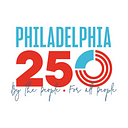Legacy for 2026: Program Update

Learn more about what our teams have been up to over these last few weeks and what’s ahead as we near closer to December when the finalists of the PHILADELPHIA250 Legacy for 2026 are unveiled at the first annual Countdown to the 250th Showcase & Celebration event at the Barnes Foundation on December 14th.
Incubation Session 1: Building Legacies in Philadelphia for the 250th
The first session took place in mid-August with a focus that was twofold: understanding what it means to leave a legacy — develop and launch a project that achieves PHILADELPHIA250’s goal of long-term impact and community transformation — and laying out the vision and values that drive each team to reach that goal. The program began with an examination of the past, assessing the impact of legacy projects created by previous anniversary celebrations. To set the stage, we were fortunate to be joined by Edward Duffy, the author of a history of past anniversary celebrations in Philadelphia. We shared stories of success and failure from the 100th (1876), 150th (1926) and 200th (1976) anniversaries to help the group understand why a community-sourced, citywide call for ideas was adopted as the model for creating the legacies of 2026.
Then the teams wrote their own values and legacy statements — defining the change and the impact that they expected to create through their project and began the creation of a framework for the design of their own projects.
Incubation Session 2: Visioning the Future: Design Thinking
September’s session introduced tools and processes from the fields of design thinking and nonprofit management that help the teams understand how to carefully design a project while remaining flexible and adaptive to realities on the ground. Teams heard from the leadership of two established Philadelphia nonprofits who shared examples of projects they had created — and that continue to change and evolve — along with lessons for how to avoid common pitfalls and be successful.
Candace Matthews-Bass, deputy director of workforce development from the Philabundance Community Kitchen, and Katie Breiner, Division Manager, Family and Housing Services for Congreso de Latinos Unidos. They described the challenges in starting the initiatives, and how they had to stop and reexamine their design along the way in order to ensure the projects were having the positive impacts and outcomes they intended. Both inspired lively conversation and questions from the project teams.
Incubation Session 3: Doing the Basics Well
And just last week in our third session, “Doing the Basics Well” Legacy semi-finalists covered fundamental topics to running a business including finance, operations, and fundraising.
The program was supported by expert instructors from La Salle University’s Nonprofit Center. Chenora Burkett, who has deep experience as a CFO and COO at various nonprofits across Greater Philadelphia, gave a mini-course on budgeting and finances. The second half of the first day then turned to Board responsibilities and management, which was led by Roshawnda Washington, who is the volunteer and engagement manager for Dow Chemical.
On day two, Dennis Maurice Dumpson of #InvestBLK led a wide-ranging discussion on fundraising and relationship management; starting with the history of philanthropy and charity — and power and inequity in the real world — and then dove into the mechanics and strategies behind a successful fundraising structure and plan. Following, incubation attendees enjoyed a panel discussion and Q&A with two experienced development and philanthropy professionals: DJ Thornton, Vice President of Development and Strategic Partnerships for the Urban Affairs Coalition (UAC); and Jocelyn Arnold, Deputy Director of the Office of Recovery and Grants for the City of Philadelphia. As self-described “partnership professionals”, they offered insight into their careers and some real-world examples and insights into how to cultivate donors and secure support for important social impact goals. Ultimately, successful relationship development involves extensive planning and preparation in advance, including background research; clear and consistent messaging by all team members; active listening; and gratitude for everyone’s contributions no matter how small.
What’s next?
In November, the incubation program concludes with an emphasis on communications and storytelling. During the final session, each project team will have 20 minutes to make a presentation and answer questions. Attended by PHILADELPHIA250 staff, project supporters and selection judges, teams will be judged on these presentations as a critical part of the competition to become one of the official PHILADELPHIA250 Legacies for the 250th.
Legacies of PHILADELPHIA250
How will the final Legacy projects be selected? Each team has already begun to assemble the elements of the final work plan that they will present to the review panel responsible for selecting the official Legacy projects for 2026. This work plan is based on a planning and implementation template created specifically for the teams by PHILADELPHIA250. Using this template, the teams will present their work during the last session of the incubation program in November, in front of the other project teams and a review panel. The review panel is composed of PHILADELPHIA250 staff, Legacy Task Force members, and community members. The final selections will be announced during the first-annual Countdown to the 250th Showcase & Celebration on the evening of December 14 at the Barnes Foundation.
In addition, all of the tools and information that the teams are using are being collected to serve as a record of the incubation program design and content. This resource will serve as PHILADELPHIA250’s legacy to the social impact field and elements may be shared in coming years as we continue to build a community of legacy projects across Philadelphia.
PHILADELPHIA250 will continue to shepherd these official Legacy projects over the next four years with the expectation that all will have launched by 2026 and begun to leave their mark on the city and positively transform their communities for future generations to come.
